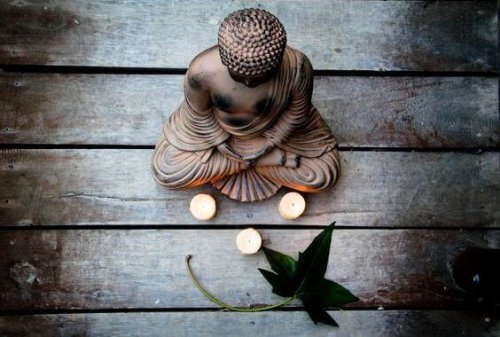The Noble Eightfold Path Relieves Suffering


Written and verified by the psychologist Valeria Sabater
The Noble Eightfold Path is something Buddha himself came up with after two months of solitary meditation. It states that although suffering is part of life, you can follow eight very concrete steps to transcend to peace.
Buddhism and Psychology
Buddhism and psychology share a common purpose: to alleviate suffering. If you delve a little deeper into the practices and strategies of modern psychology, you’ll see that they draw from religious, spiritual, and philosophical traditions.
Dr. Alan Wallace from the University of San Diego published an interesting study in the American Psychological Association magazine that extrapolated on the benefits of joining the two disciplines. He believes that building bridges between Buddhism and psychology can help people enjoy better emotional health.
Along those lines, useful theories like the Noble Eightfold Path, delivered by Gautama Buddha, makes it easier to delve deeper into different aspects of suffering. It’s a principle of personal growth, self-improvement, and enlightenment that can help alleviate suffering.
“Pain is inevitable, suffering is optional.”
-Buddha-

What’s the Noble Eightfold Path?
The Noble Eightfold Path is part of what are called the Four Noble Truths. After two months of complete isolation and meditation, Buddha became certain that he had found enlightenment. The first step he took to achieve this was to understand and overcome suffering. Suffering is a thin veil, subtle and semi-transparent, that affects the way you see the world. It could be the source of all your unhappiness.
Buddha focused on sharing the Four Noble Truths. He believed that once you figure out the root of your inner torment, you’ll be able to heal and reach enlightenment through the Noble Eightfold Path. This path consists of eight strategies that you must understand and practice daily. The first step on this path to healing is understanding the Four Noble Truths.
“What you are is what you have been. What you will be is what you do now. “
-Buddha-

What are the Four Noble Truths?
- All existence is suffering. As the Sutra Benares says (the first recorded teaching from Buddha), birth is suffering, old age is suffering, illness is suffering, death is suffering, living with something you don’t want is suffering, not getting what you want is suffering… Life itself is often tinged by suffering. Accepting and understanding this is the first step in the growth process.
- The origin of suffering is craving. You live with many “poisons” or harmful things that nourish the seed of pain. The “poisons” that Buddha refers to are attachment, hate, jealousy, the feeling of scarcity, and ignorance, among others.
- Suffering can cease. The third truth tells you that you have the power to end your suffering in a very concrete way. All you have to do is address the root cause.
- Ending your suffering requires practicing the Noble Eightfold Path. We mentioned at the beginning that it’s possible to get rid of your problems and turmoil. Your unhappiness and worries can disappear forever if you put Buddha’s principle into practice.
The Inner Journey of the Noble Eightfold Path
The eight steps on the path to liberation are grouped into three pillars that define Buddhist practice. They’re also closely related to many schools of thought in psychology based on humanism and positivism. The three pillars that make up the Noble Eightfold Path are right behavior, mental discipline, and wisdom.
Buddha talked about this practice all the time. He considered it an essential part of his philosophy, the legacy that he wanted to leave behind for all humanity.
The principles of the Noble Eightfold Path
- Right view. You must understand that everything in life is fleeting. Things come and go, run their course, and begin and end.
- Right resolve. Your thoughts determine your quality of life. If you try to focus on hope, freedom, and balance, you can avoid suffering.
- Right speech. It’s very important to tell the truth and speak to others honestly. Don’t talk for the sake of talking nor fall into empty discussions. Don’t criticize or disparage others.
- Right conduct. Be kind. Kindness brings balance. Respect and humility bring inner peace (less suffering).
- Right livelihood. Your job, your behavior, and your actions (big and small) should always be directed towards the good.
- Right effort. You’ll achieve nothing in this world without effort. Only when you invest your energy and hope into something will you feel fulfilled, complete, and fortunate.
- Right mindfulness. Control your mind, train your attention, and fix your gaze on something without forgetting your goals nor losing your humility.
- Right samadhi. The last step in the Noble Eightfold Path is, of course, related to meditation. A calm mind is free of worry and suffering. Meditation is a way to free yourself and reach enlightenment.

In conclusion, the Noble Eightfold Path is inspirational. Using it as a guideline will no doubt improve your quality of life. What do you have to lose? Try it out today!
This text is provided for informational purposes only and does not replace consultation with a professional. If in doubt, consult your specialist.








